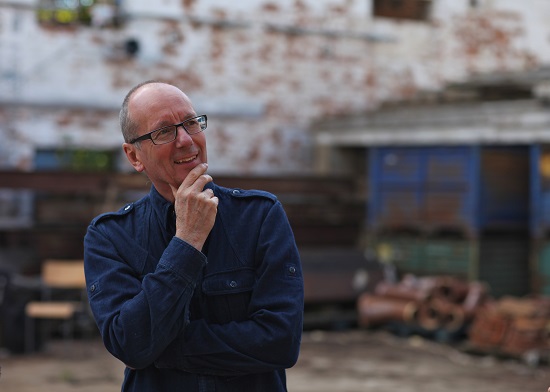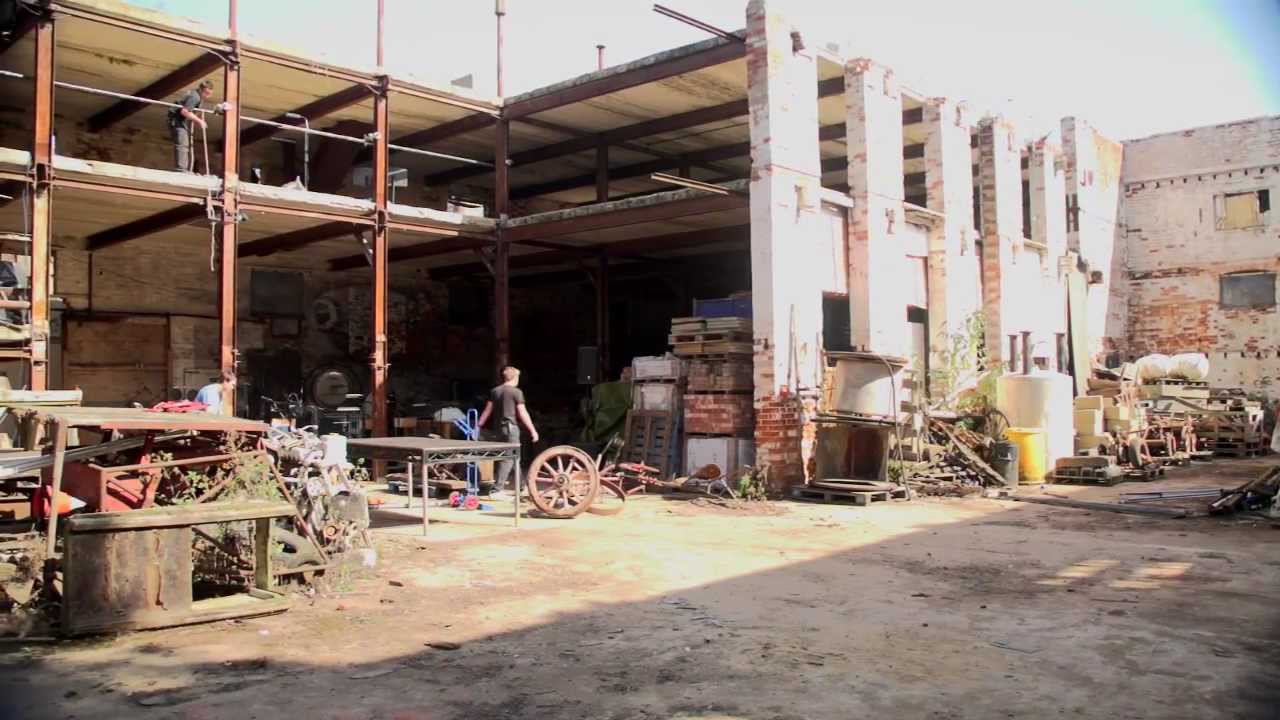Recording artist, opera composer, author, music journalist, onetime Flying Lizard and now professor of audio culture and improvisation at London College of Communications, David Toop ushers us, with his latest book, Into the Maelstrom: Music, Improvisation and the Dream of Freedom. He also appears as a guest at Wysing Polyphonic Festival this Saturday, July 2
Simon Finn – Pass the Distance
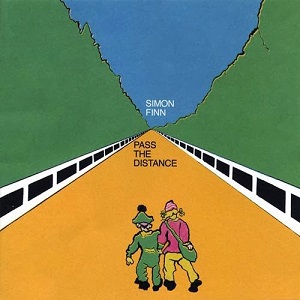
David Toop: This was the first record I worked on. The interesting thing about the record was that I played with Simon recently, and I’m going to be playing with him in July [2016] again. There’s a sense of trajectories that are extraordinary about a life like this. You can reconnect with people and go back to playing with them after years and years of not even knowing if they’re alive.
I played loads of instruments on this record – loads that I couldn’t really play! I always say to him, “I ruined your record”. And he says, “No, no, if you hadn’t done it, nobody would remember my record,” so he’s very gracious about it.
But we were 20, 21 years old, very young. [I knew him] just by accident; I was playing with a drummer who I’d just met, Paul Burwell. We were playing sometimes in the Roundhouse, where I was working behind the bar. Sometimes at night we’d play in a pub called the Enterprise, which is opposite the Roundhouse – it’s still there. It was a bunch of beatniks one night, and there was this guy with a cigar, and he shuffled us to one side after the gig, and said, “I’m working for a singer-songwriter, would you like to play on his record?” And he had a studio just around the corner from the Enterprise, and it was incredible: he had one of the only 8-track machines in England at the time, and a fantastic engineer. It was just stunning, you could do what you wanted.
I think that feeling of not really knowing what’s happening [is part of being young] – as you get older, you get more and more conscious of almost every moment, every event. I don’t mean I give the same intensity to everything I do – if I did that, I’d be dead, but I’m very conscious, I make notes, and I have a fairly good idea of what’s happening in my life. Then, I think I was like [a game of] skittles, knocked apart by this wooden ball, and there’s a strength to that: you’re not too self-conscious about what you’re doing, so you’re not too worried about it.
Certainly that was true of me at the time. If I’d thought, “I can’t really play this instrument,” I wouldn’t have done it! But I didn’t care, you know. I didn’t care!
I’d entirely forgotten about Pass The Distance, and then I went to Japan in 2000, and was asked to do interviews with all these journalists, who were showing up with bootlegs of this record, asking me to talk about it. I was astonished. It kind of gained momentum. Eventually it was reissued on CD, and then we ended up playing together again this year.
David Toop And Max Eastley – New And Rediscovered Musical Instruments

How did New & Rediscovered Musical Instruments, released on Brian Eno’s Obscure label, come about?
DT: At that time, 73 and 74, I became aware that there were a number of us making instruments. Max Eastley was a good friend and he was making instruments, Paul Burwell and I were making instruments, Evan Parker was making instruments, and we knew Hugh Davies, who was a real pioneer of these amplified instruments. Paul and I had also got interested in making books. We’d been working with Bob Cobbing, the sound poet, since the beginning of the 70s, and Bob had this press called Writers Forum. And Bob would do a book in an evening: Christmas Day, he’d do a book. He was just like, “Do you want to do a book?” “Yeah, OK,” “Let’s get going” – he was that kind of character. It was very inspiring to us – we were much younger, of course. But it made us realise you can do this. Never mind that nobody’s interested in it in the mainstream media.
I had the idea to do an anthology about instrument-making. At that time, Paul was at Ealing College of Art, studying art: basically, he was doing that to use the facilities. In other words, if we wanted to do a book, then we could do it there.
What happened after that? I think I sent one to Brian Eno. I don’t know how I got to know his address, but I sent one to him. He called me up and he said, “I really like the book, and I’m starting a new label, would you liked to do something?” It was a tricky situation for me, because I’ve always had this thing in my life of a tension between collaboration, which was extremely important to me, and then being alone. Make of that what you will! I think Paul and I had come to the end of a phase of working together. We were very close, we were sort of like brothers in a way, but I was beginning to feel I wanted to do something beyond that. So, I think what I did really was quite dishonourable, in the sense that I said to Brian, “Well, I want to do it solo.” It’s one of those things in my life I’m not particularly proud of. But I had ideas about music and sound and listening and time and so on that I wanted to pursue as an individual, and by doing that book, Brian opened the door, and he decided to do a record based loosely on the book, and Max was the obvious candidate. In fact, I asked Paul, and Hugh Davies, who was also in the book, to play, and Paul graciously agreed to that. It makes me feel even guiltier.
I was at a time of my life of making choices, I suppose: am I a writer, am I a visual artist? And when I was a teenager. I thought I would be a film-maker. Am I a musician? If so, what kind of musician am I?
The Flying Lizards – The Flying Lizards
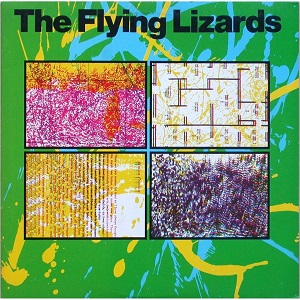
DT: There was barely anything of Flying Lizards’ recorded output that I appeared on. I was associated with the Artist Placement Group in the early 1970s and David Hall, the video artist, was an Artist Placement Group artist. I was completely broke at that time, and he said to me, “Come and do some teaching” – he was head of department at Maidstone College of Art. And I went and did a couple of teaching days and practically the only person who showed up was David Cunningham [Flying Lizard’s main man], with all of this finished work. It was incredibly impressive, because on the one hand, you had these people who couldn’t even get out of bed, and then on the other hand, you had this guy who was basically doing really, really good stuff already, he was a student.
He’d already made ‘Summertime Blues’ at Maidstone as a student, so he already had his first single. You just knew this was a guy who’s going to go far. And then of course ‘Money’ [Flying Lizards’ cover of a Barrett Strong composition, also covered by the Beatles] was a huge hit. ‘Money’ was basically David and one other guy and Deborah [Evans-Stickland], the singer. It was a very lo-fi, minimal single. But for the live Top Of The Pops and all the rest of it, he got in Steve Beresford, and if you look at videos from that period, they’re hilarious, ridiculous, just crazy. You think, “How did they get away with this?” It’s just mad. Of course, it was a big hit, and Virgin said, “OK, you can do an album,” so David called in friends. We recorded this single called ‘TV’ and those records just came together in the studio.
‘TV’, I felt, was quite strong, but David’s a very interesting character. He has more integrity than is good for him. So, everything he did after that sort of undermined what he’d done. Other people who kind of took life more cheaply, would have really gone for it. David almost did everything he could to scupper the whole thing, which I very much admire, but of course it was deeply irritating then, because we wanted to make a bit of money! So we made this very catchy tune and then he added a bunch of weird stuff which was all very strange.
But we did do Top Of The Pops. It was an eye-opener. I mean, one of the things that was so interesting – I’ve talked about this a few times recently, and people can’t believe it – they used to do this thing called tape switch with the Musicians Union. The Musicians Union declared you couldn’t mime on Top Of The Pops, which is obviously impossible, if you’ve got a studio-based record that you’d worked on for a year or something. And there were a lot of terrible performances. Because on Top Of The Pops, you were just thrown onstage. You get there, a quick rehearsal, and then you were thrown onstage. It’s one band after the other. So they used to do this thing of tape switching, where you’d assemble in the studio, and the Musicians Union representative would come, and the record company representative would come, and the record company rep would take the MU guy out for dinner, and the engineer in the studio would make him a quarter-inch copy of the master tape, and then I guess a lot of people would just sit around and do whatever they did until they came back. And then they would give the MU guy the tape and that would go to the BBC. So, it was this collusion, and we were thinking, “OK, so this is how the music business works."
We did another single at that time. We recorded a ska version of ‘The Laughing Policeman’! Virgin didn’t want to release it, so Arista released it under the name of The Suspicions, it’s a crazy record. You can find it on YouTube.
I guess we all had that work ethic. None of us were rock stars, so if you had time in a studio, it was a big, big deal: you’re not going to sit around taking drugs and drinking and waste it, you’ll do something.
David Toop – Screen Ceremonies
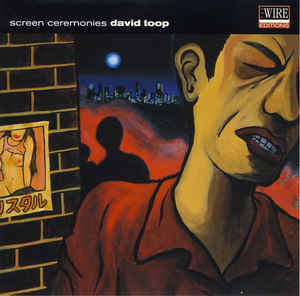
This is a record that was really important to me. I’d just written the book Ocean Of Sound, and this terrible thing happened in my life: my wife committed suicide. I was a single parent because of that; I was completely shattered. I had a book that I’d just finished that had been produced through a really, really terrible period, but I had managed to finish it. And so you can imagine, not just the emotions, the psychological state I was in, but also the conditions I was working in, being a single parent with a grieving child of five years old. It was horrendous. I couldn’t go out much, because I had my daughter to look after. So people used to come round, and Tony Harrington from The Wire came round.
We drank quite a lot and he said, “We’re thinking of starting a record label at The Wire; how about you do a solo record?” I said, “Well, how am I going to do that?” I thought about it, and I’d been working on a lot of music in the years before, and I was working as a journalist, full time, really, up until that point; in whatever little spare time I had, I was working on music. So I said yes, and simultaneously, Simon Hopkins, who was working at Virgin, I asked him for advice. I said “The publisher Serpent’s Tail is asking me to do a compilation album for Ocean Of Sound.
So the compilation was sort of planned, but really it was just a last minute thought from them, and I said to Simon, “Can you give some advice about record companies I should go to,” and he said, “Well, Virgin! We’d like to do it”. So, I took a week off, well, five days, and Juliet, my daughter stayed with her grandmother, the neighbours, whatever, and I went into the studio with a clipboard, virtually, ticking things off. It was so pressurised, because I knew I had just that size of budget and that time, and that was it. And I had to get the whole record done in that time.
This record was in some ways a kind of grief record, and in other ways, a very positive record. One of the things about grief – I wouldn’t generalise, because everybody responds to tragedies in different ways – but I had a huge amount of energy. I needed a huge amount of energy to cope with my life. I had a huge amount of energy where stuff was concerned: it was as if all this unconscious material had been unleashed. And all of these things came out more or less at the same time. Screen Ceremonies, my solo record came out at the same time as the book Ocean Of Sound, and the Ocean Of Sound double CD came out just a bit after.
It was my first solo record, full solo record, because New & Rediscovered Instruments had been shared with Max on one side and me on one side. It was also in a situation of extreme adversity, and partly feeling that there were a lot of people to support me at a time like that. That was the feeling: if I can function now, in this horrendous situation, and hopefully be a good parent, what’s there to worry about in life, you know?
But also it reminds me of now. Again, I’ve been through a difficult situation which I don’t particularly want to talk about – it wasn’t so bad, but it was bad enough – and I felt really kind of knocked back by it, and then suddenly I was in a situation quite similar, having a new book out and a record out at the same time, and I suppose it’s a certain something that I believe in – that you don’t have to be restricted to one practice, one activity. It’s something I talk about a lot to students, this idea of fluidity of practice – that you don’t have to just put yourself in a box, people don’t have to put you in a box. You can have the confidence to move across, and combine and learn from each different practice. They inform each other.
David Toop – Ocean Of Sound [book and album]
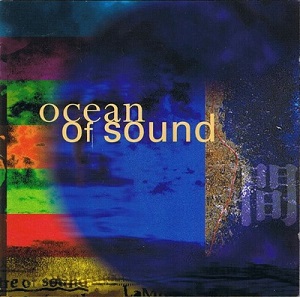
Were you surprised at the success of Ocean of Sound, the book and the double CD?
DT: I remember I did quite a lot of interviews when the book and the CD came out, and I did a drivetime interview for Radio London or something. You wouldn’t immediately associate the music on Ocean Of Sound with drivetime radio, but people found things that they liked, and the DJ was playing some records at 5 o’clock in the afternoon on a weekday. The man who was playing them said to me, “That Peter Brotzmann track, it’s like having your head boiled in acid.” And no, he didn’t mean it in a good way. So yeah, there are things intentionally challenging on that record.
Which saved it from being a polite world music compilation.
DT: Yes, there is a tendency with those for everything to become homogenised, and there were extremes in the book, so it would have been dishonest to create a record that didn’t have extremes that really took you places you didn’t want to go. Which I was saying in the book, I suppose: this is the range of music, I think it’s important, it’s a 20th century book, and I’m not going to pretend that the difficult ones are not there.
Were you surprised at the success of Ocean Of Sound?
DT: I was really shocked. Because it felt kind of like I was an apprentice, and although I really loved doing it and was very, very interested in it and it was very much part of my history, I’d been listening to African-American music since the first record I ever bought, which was by Sam Cooke. And it sounds more like my private thoughts that I never thought I would be able to articulate – I never thought I would be able to express publicly. And I found a way to do it. I thought, nobody’s going to get this. And yet a lot of people did, and they still do. One of the nicest things is that I still get, very ambiguously, people saying to me, “Oh, I’m just reading your book.” And I say, “Which one, for God’s sake, I’ve done six now!” “Oceans of Sound”.
That, of course, is great, because I do still have dips of confidence or [can think] everything I do is rubbish. You asked me if a writing book gets easier: every time. Well, every time when it comes to writing a book, I think, “I’m the last person in the world that should be doing this, I don’t know anything, I can’t do this." And I went through years of that with Into The Maelstrom.
David Toop – Star-Shaped Biscuit
DT: Star-Shaped Biscuit was interesting. I’ve always had a lot of problems with confidence in my life, and I’ve always depended upon solidity. So, when Ocean Of Sound came out, and it was surprisingly well reviewed in surprising places, I felt, I would say, confident for the first time in my life. Star-Shaped Biscuit was where I’d come to a point in my life where I really wanted to do something different. I think if I look back at my life, it’s characteristic that I have a period of burning my boats, it may be a cyclical thing, stopping to think and going in a completely different direction.
I thought I wanted to work in a different way; to work in a composing way, doing maybe more like the feeling I had just before I recorded the Obscure album in 1975. I’d been doing all this electronic stuff working alone, and I wanted to do something that felt more solid. And one day I got some normalish junk mail through the post, and one of them was an opera-writing course at Aldeburgh, headed “Please disseminate to your students”. I remember standing there on a Saturday morning in my dressing gown, opening the mail, thinking, “I want to do this.” And everybody thought I was a bit mad. I applied to do it, and Jonathan Reekie was then director at Aldeburgh and he just said, “I’m gobsmacked, but if you want to do it, I think we’ll be really happy.”
It was sort of 50% horrible. It was like Big Brother, residential with a bunch of people, some of them a bit difficult, you know, very different ages, I was one of the two oldest people there, thinking, “What am I doing here? I don’t even like opera.” I couldn’t read music! And I still can’t. I never read music. I remember I didn’t even know if I was going to be there as a writer or a composer, and then made a decision on the first or second day, “OK, I’m going to be a composer.” And Harry Birtwhistle said, “OK, we’re going to work on this idea.” I said, “Can I bring a laptop?” Because that’s all I had to make music. He said, “Do we have to?”
But he was great. I had a lot of arguments with him, but he was wonderful, and he came up to me afterwards, after I’d been arguing with him relentlessly for a week, and he just held my hand and said thank you. He was so nice. I think he appreciated somebody who was standing up to him.
But I learnt so much, and I thought, “This is what I want to do, work with voice and stage.” I’d actually come out of it quite well, considering this impossible situation, because other people, more conventional composers, had been really dragged through the coals backwards, particularly by some of these opera singers, who were absolutely cold-blooded in the way they went about it. But they were OK with me, because I think they saw I was doing something different. I kind of knew what I wanted to do, and I was pretty strong about it, and they respected that, even if they didn’t like what I wanted to do.
So there was an open pool to apply for support to develop an opera, and I applied, me as the composer and librettist, and I was one of the people that got one, which was like a miracle! And that was the beginning of Star-Shaped Biscuit. We workshopped it, we decided how I was going to do it, and that I was going to compose the piece on computer, that would be a template, and we would workshop it with musicians, instrumentalists and singers, and having written the libretto, we would develop it through improvisation, and that’s what we did in Aldeburgh, at Snape Maltings. And I have to say, those weeks were some of the happiest times I’ve had. I still work with some of those people now; some of them are really close friends.
So, there was something really special, collaborating in that way. It was very intense, it was very tough, because I wanted – particularly from the singers – the smallest positions from them. I had always, since my early 20s, been interested in shamanism and spirit beings, and that was very much embedded within the libretto, and I was demanding a lot from them, but they really responded.
And then there was a period of hiatus, nobody wanted to do it, it was impossible for me to break into this hideous opera world, totally outside me, and then I was back in Aldeburgh working on another project, and Jonathan said, “Is there anything we could do?” and he said, “Maybe we could do the opera in one of the ruined old factories,” and I said, “Jonathan, I said that to you a year and a half ago, and you said it’s too dangerous” and he said, “Ah, well, we’ve done some work on them since then.”
And it was perfect, full of all these weird machines, there was even a horse cart, all that 19th century Snape Maltings hops, old cars, and it was incredibly atmospheric, open to the air. The weather when we were rehearsing it was shocking, so we didn’t really get to rehearse very much in the actual space. But it was magical, bats flying about. It wasn’t perfect, but I thought, bearing in mind the lack of resources and there was no director and very minimal lighting and we hadn’t even had a proper run-through, yeah, it was great.
And I did a number of pieces after that, I really enjoy working with singers, particularly with Elaine Mitchener, who had been one of the characters in Star-Shaped Biscuit. But after a while, I felt this opera world is just too hard, I’m never going to break into it, so I just sort of cut my losses, really, and thought, “I’m not going to spend the next ten years of my life, into my 80s, trying to break into this world which doesn’t want me.” So I sort of changed direction again. But it was fun while it lasted, and I met some great people and learned a lot of things.
I must say, writing the libretto was an extremely interesting process. There’s virtually not a single line of that libretto that’s mine, so I took lines from everywhere: Shakespeare, Virginia Woolf, everywhere. The story was too dense, but then, that’s me.
David Toop – Entities, Inertias, Faint Beings

DT: This is my latest album, and it was recorded at roughly the same time as Into The Maelstrom was being written. For reasons of personal circumstance, I had a number of quite isolated periods last year. The first time, I went to Australia, and Lawrence English, who released this record, also organised some talks and concerts for me in Brisbane, and also a writer-in-residency [spot] in two isolated places, both in Queensland. I actually didn’t write a word, so I felt somewhat guilty, because he was so nice. But it was what I really needed at that time, to sort of reconnect with something in myself, particularly listening to a certain kind of music.
In the daytime, I was listening to the birdsong, and Australian birdsong is just spectacular, and I was absorbing it and thinking about that, and then in the evening, when it was cold, because it was winter and it was high up in the mountain, I was listening to all this music that I used to listen to a lot: Japanese gagaku music, Bhutanese Buddhist music, and so on. And it really reconnected me, grounded me at a time when I was really floating through because of things that had happened to me in my personal life.
Maybe I just don’t write when I go away into that perfect writing situation: maybe that’s it. But what I did do was start listening to files I had on my laptop. So, I started listening to all of these sound files I had on my laptop of music I’d been making for some years. I’d got into a situation where I couldn’t justify releasing a record in the 21st century: I couldn’t see the point. Because the whole CD thing had collapsed, because physical objects had got less and less important, record shops had shut down, and people seemed not to be buying things. What did it mean to make a record anyway if people were listening in a completely different way?
But when I was in Australia, three years ago, Lawrence was driving me along the Gold Coast, and I said to him, “I can’t see the point,” and he just talked to me for a while about what he thought the point was. He’s much younger than me, he’s more full of joie de vivre, he runs a record company, and he’s a very proactive man, as you have to be if you’re in Australia, because if you’re not travelling proactively, you’re stuck, thousands of miles from anywhere. I listened to what he said, and I was impressed. Also, he’d invited me to make a record for his label. And that’s it. And gradually, I started to listen, when I was in Cornwall, and Cornwall has a big significance for me, emotionally and sentimentally, for all kinds of reasons. I think just that situation with the emotional weight of being there was very important, and I started to these files and thinking, “Actually, I can start to put this together,” and gradually a record came into being.
I sort of had a feeling of what the record was about. It’s about the idea of this music being a living entity or living entities, and you bring it to life, and you bring, you create a kind of hybridity and that really has a life of its own which takes over from your actions, your volition. So that was a very important moment for me, I think.
So are you reconciled to the idea of releasing a physical object in the 21st century?
I had another conversation about that – and this was a funny one. I don’t really do much interviewing any more, and generally, if people ask me, I say no, but I was asked to interview Scott Walker for Pitchfork some years ago, and I have a diminishing want list of who I would like to meet, but he was on it, and so I said yes. He’s very cagey, he’s very skilled at avoiding the point, but perfectly nice. It’s extremely impressive, and frustrating. I’m experienced enough to know that I’m just not going to get where I would like to be, no matter how many tricks I pull out! But when we finished – I mean, it was a perfectly interesting interview – he said to me, “What are you doing?” and I was, “Wow, Scott Walker’s asking me what I’m doing”. I was sort of overcome by flattery for a bit. And I said, “Well, musically I’m kind of stuck in this position where I can’t justify releasing a record,” and he said, “It’s what we do.”
I thought, who would argue with Scott Walker, with a career like his, where he’s always taken the more difficult and interesting path, he’s always plugged away at it, even when it would be sensible not to do so. That really impressed me and it stuck in my mind, and it sort of combined with what Lawrence had said to me – a young guy who I respect a lot for his energy and his positive approach to all of this stuff, and then a real veteran who’s older than me, who’s had an incredibly complex and convoluted and amazing career.
And I was sold on the idea. I thought, “Of course, in the end, it doesn’t matter how many people buy it; even if five people buy it, you’re working on the material you have and it’s not just sitting there in this hard drive, which may get wiped at some time”.
Tapes are very vulnerable. And once somebody has an object, it exists in the world. Other people are thinking about it, dismissing it, trying to figure out what it means, and forgetting about it, the object exists there in the production. So all of that is important, I think.
David Toop – Into The Maelstrom: Music, Improvisation And The Dream Of Freedom
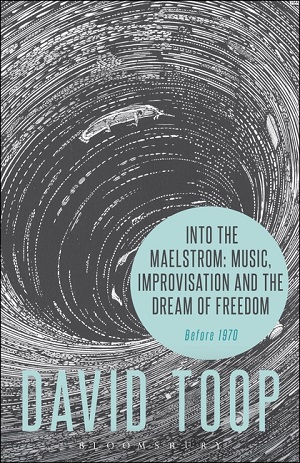
You mentioned the fragility of music…is this book a way to preserve the ephemeral?
DT: I have a first-hand experience of this music going back to 1966. I was very young, and now I’m not very young, I’m 67, and I think well, when my generation goes, there’s a whole load of stuff – oral history, if you like – that disappears, so there’s a responsibility to put it down.
Improvised music is so fragile, so ephemeral. I’ve played a lot of gigs this year and last year, and some of them, I think, are some of the best gigs I’ve ever played, but they were not recorded, and the audiences were small. It’s fine, you accept that, but it means that the life itself, which is almost outside critical discourse, is something that can just slip away. I’m conscious of that, writing about the history, and so much of it is so fugitive and so much of it is discussing people who are almost forgotten.
Strange that someone who has anxiety about performing is writing about something that is a site of anxiety.
DT: Absolutely, but I think that state of mind enhances it: you know what you’re talking about. I think because of being through it as a player, you understand, as an organiser, as somebody who has been closely involved – you’ve seen other people’s vicissitudes, you’ve seen other people’s crises, and you go through them together, in a sense.
Someone is quoted in the book asking improvisational musicians, How do you know what to play? Surely that’s not a stupid question. How do you know if it’s shit or not?
DT: No, it’s not a ridiculous question, but you forget that it’s not a ridiculous question. As somebody who lectures frequently, not really in a teaching sense any more, but doing seminars, and often speaking to students who come from completely different specialisms to me – the other week, graphic design students, photography students the week before that – I got to the point of thinking, “Well, I’m just bored with showing up prepared, so I’ll show up unprepared,” you know, because that’s the best way to learn things, and the best way to confront the terror that this could be the time when it all goes horribly wrong. This could be the time when you can’t think what to say or do. I do that to myself deliberately.
I guess it’s about wanting to get out of your comfort zone, because you get to the point of knowing that if you’re in your comfort zone, then it’s deadly.
You get people who are really pushing it, and then you get other people who are quite comfortable or complacent. But that’s inevitable, that’s life. And I think it’s the nature of the activity is throwing out an extra demand to people. There is this idea of the word free, this conception of what it means to be really free, which I guess the younger players, it’s not even interesting to them to think about it, but for those of us who grew up in that era, you feel you had to think it through, you know, you feel you have to think what does it mean, and how can you be free?
Would you agree with Schönberg that composing is just slowed down improvisation?
DT: No, I don’t. I think it’s like Jacques Derrida saying that improvisation is writing: it is and it isn’t. It’s composing and it isn’t, and something different happens, and I think it’s to do with timing. It’s not to do with it being slowed-down composition, it’s to do with more of a Joycean sense that any moment in improvisation can go in a different direction, in the same way that in Finnegans Wake, any word can become another word, or it can become another meaning. And if Joyce had been even more superhuman than he was, then that’s what Finnegans Wake would have been: every single word would have opened out into infinity. It would have not been just unreadable, but unthinkable!
But I really believe that about improvisation, and of course, you know, eight times out of ten it doesn’t happen, but those two times out of ten, where it happens, you really feel it’s just a sequence of wormholes into all those different possibilities. It’s exhilarating, but it demands a lot of attention and commitment from the listeners. That’s when you realise. I think a lot of the people who have theories of improvisation may think that if everybody understood free improvisation, the world would be a better place! You realise there are a lot of people who just are never going to go there, and you totally understand why. And so it’s probably going to always be this tiny scene of people following this pursuit, which is a different way to think about life, and it’s a different way to think about music.
Would you say this is a political book? At one point you say how deluded it is to think that human beings can organise themselves into musical coherence without a leader, one who takes the money and credit leaving the rest to die in penury.
DT: I felt angry when I wrote that line, I remember, and I remember looking back at it quite a number of times and thinking, “I should take this out, because it’s too cynical and maybe it will be misunderstood,” but in the end I left it, because I did feel quite angry when I was writing the book, as any thinking person should, about the situation we’re in with neoliberalism and the vast gulf between rich and poor, and the vast gulf between what’s considered legitimate and what isn’t. For so many years, people have been saying improvised music is worthless because there’s no audience, and to me, that’s a neoliberal argument; that’s like saying the more people experience something, the bigger the audience, the better it is. And that’s affected, as you know, books and music.
I felt like making the strongest possible statement I could about something that isn’t popular, and will never be popular, but has value and we can learn from it. For ten years, I’ve run workshops at the London College of Communications in improvisation, and I always say the same thing to them: “I’m not teaching you to be expert musical improvisers; I’m teaching you something about opening up a situation, not telling you something. And by opening up the situation, I’m providing you with the conditions so that you can learn something and you can apply it elsewhere in your life, in your practice, wherever those may come.” And I hope that’s the case, that you can learn lessons about how things work or how to work with other people, how to work within groups when everybody is different from you, and has different ideas on how to learn things in a dialogic process, where you’re not trying to hammer other people into the ground, to prove that you’re right and they’re wrong; you’re trying to understand how different people can function together and make something constructive. If we’re talking about it in terms of politics, to me, that’s one of the values.
Into The Maelstrom is out now published by Bloomsbury

